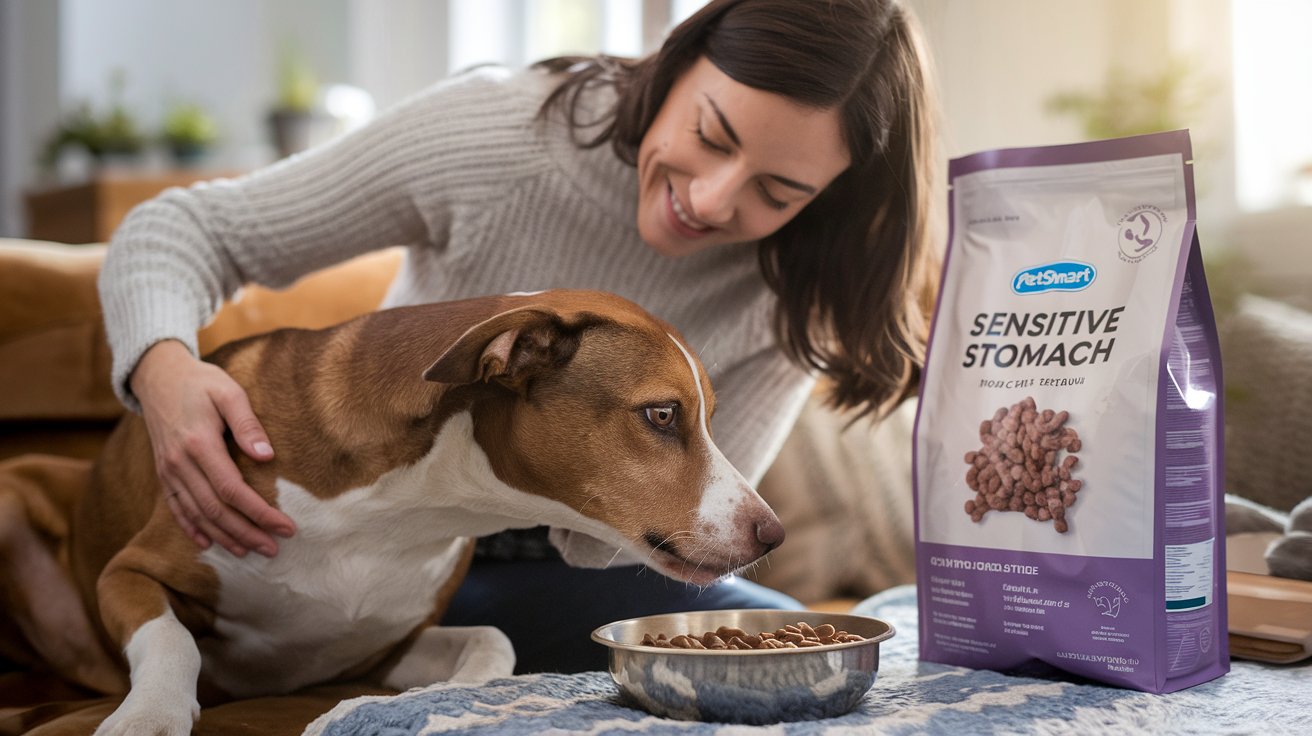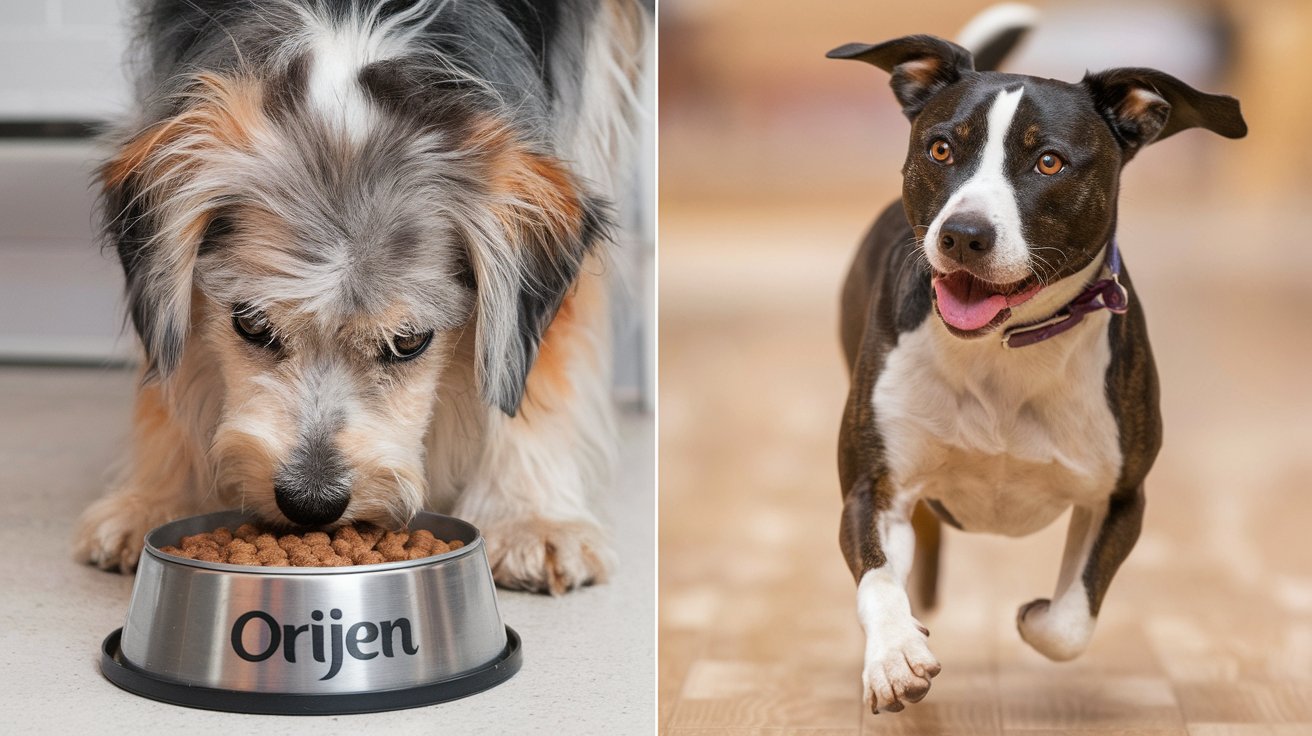PetSmart Dog Food for Sensitive Stomachs: A Comprehensive Guide to Optimal Canine Nutrition
Introduction
As a pet parent, ensuring your dog’s well-being is a top priority, and one of the most critical aspects of this is their diet. Just like humans, dogs can have sensitive stomachs that require special attention. This sensitivity can manifest in various ways, including digestive issues, skin irritations, and even behavioral changes. The right diet can make a world of difference for dogs with sensitive stomachs, and PetSmart offers a range of options designed to cater to these specific needs.
In this comprehensive guide, we’ll delve deep into the world of dog food options available at PetSmart for sensitive stomachs. We’ll explore the ingredients that matter, what to avoid, and how to choose the best food for your furry friend. We’ll also compare some of the top products available at PetSmart, providing you with all the information you need to make an informed decision.
Understanding Sensitive Stomachs in Dogs
What Causes a Sensitive Stomach in Dogs?
Sensitive stomachs in dogs can be caused by a variety of factors, including:
- Food Allergies and Intolerances: Just like humans, dogs can develop allergies to certain ingredients in their food. Common allergens include grains, dairy, beef, chicken, and soy. These ingredients can cause gastrointestinal upset, leading to symptoms like vomiting, diarrhea, and flatulence.
- Dietary Changes: Sudden changes in a dog’s diet can upset their digestive system. If your dog is used to a particular type of food and you switch brands or ingredients too quickly, it can lead to digestive issues.
- Underlying Health Conditions: Conditions such as inflammatory bowel disease (IBD), pancreatitis, and gastritis can make dogs more susceptible to stomach sensitivities.
- Stress and Anxiety: Believe it or not, stress and anxiety can affect a dog’s digestion. Dogs that are anxious or stressed may develop a sensitive stomach as a physical response to their emotional state.
Symptoms of a Sensitive Stomach in Dogs
Recognizing the signs of a sensitive stomach in your dog is crucial for addressing the issue promptly. Common symptoms include:
- Vomiting: Frequent or chronic vomiting can indicate a problem with your dog’s diet or an underlying health issue.
- Diarrhea: Loose or watery stools are a common sign of a sensitive stomach.
- Flatulence: Excessive gas, particularly if it’s accompanied by discomfort, can be a symptom of dietary intolerance.
- Lack of Appetite: If your dog is reluctant to eat or seems disinterested in food, it may be because their stomach is upset.
- Weight Loss: Unintended weight loss can occur if your dog is not absorbing nutrients properly due to digestive issues.
Why PetSmart Dog Food for Sensitive Stomachs?
PetSmart is a trusted name in the pet industry, offering a wide range of products designed to meet the diverse needs of dogs. When it comes to dog food for sensitive stomachs, PetSmart provides several options from reputable brands that focus on high-quality ingredients, balanced nutrition, and specialized formulas.
Quality Ingredients
The dog foods available at PetSmart for sensitive stomachs are formulated with carefully selected ingredients to minimize the risk of digestive upset. Common ingredients you’ll find in these products include:
- Easily Digestible Proteins: Proteins like chicken, turkey, lamb, and fish are often used because they are easier for dogs to digest and less likely to cause allergic reactions.
- Limited Ingredient Diets: Many of the options available are limited ingredient diets (LID), which reduce the number of components in the food to decrease the chance of an adverse reaction.
- Probiotics and Prebiotics: These ingredients support a healthy gut microbiome, which is essential for proper digestion and overall health.
- Fiber-Rich Ingredients: Fiber helps regulate digestion and can be beneficial for dogs with sensitive stomachs. Ingredients like pumpkin, sweet potatoes, and brown rice are commonly used.
- Grain-Free Options: For dogs with grain allergies or intolerances, grain-free formulas are available, using alternative carbohydrates like potatoes or peas.
What to Avoid in Dog Food for Sensitive Stomachs
While the right ingredients can make a world of difference, it’s equally important to know what to avoid in dog food for sensitive stomachs:
- Artificial Additives: Artificial colors, flavors, and preservatives can irritate a dog’s stomach and should be avoided.
- Fillers: Ingredients like corn, soy, and wheat are often used as fillers in low-quality dog food. These can be difficult for dogs to digest and may trigger allergic reactions.
- By-Products: Meat by-products are lower-quality ingredients that can include parts of the animal that are less digestible. High-quality dog foods use whole meats instead of by-products.
Top PetSmart Dog Foods for Sensitive Stomachs
Now that we’ve covered the basics of what to look for (and what to avoid), let’s dive into some of the top dog food options available at PetSmart for sensitive stomachs. These products have been carefully selected based on their ingredients, nutritional value, and customer reviews.
1. Hill’s Science Diet Adult Sensitive Stomach & Skin Chicken Recipe Dry Dog Food
Overview: Hill’s Science Diet is a well-known brand that specializes in science-based nutrition. Their Sensitive Stomach & Skin formula is designed to support digestive health and nourish the skin. It contains easily digestible ingredients and is rich in omega-6 fatty acids and vitamin E for skin health.
Key Ingredients:
- Chicken
- Brewers rice
- Yellow peas
- Chicken meal
- Cracked pearled barley
Benefits:
- Promotes healthy digestion with prebiotic fiber
- Supports a balanced microbiome
- Gentle on the stomach with high-quality protein
Why It’s Great for Sensitive Stomachs: This formula is crafted with high-quality, natural ingredients and is free from artificial colors, flavors, and preservatives. The inclusion of prebiotic fiber helps maintain a healthy gut, making it ideal for dogs with sensitive stomachs.
2. Purina Pro Plan Focus Adult Sensitive Skin & Stomach Salmon & Rice Formula
Overview: Purina Pro Plan Focus is tailored to meet the specific nutritional needs of adult dogs with sensitive skin and stomachs. The formula features salmon as the first ingredient, providing an easily digestible protein source. It’s also fortified with live probiotics to support digestive health.
Key Ingredients:
- Salmon
- Barley
- Ground rice
- Oatmeal
- Canola meal
Benefits:
- High in omega-3 fatty acids for skin health
- Contains live probiotics for digestive support
- Rich in antioxidants to support the immune system
Why It’s Great for Sensitive Stomachs: Salmon is a novel protein for many dogs, making it less likely to cause allergic reactions. The inclusion of oatmeal, which is gentle on the digestive system, makes this an excellent choice for dogs with food sensitivities.
3. Royal Canin Veterinary Diet Gastrointestinal Low Fat Canned Dog Food
Overview: Royal Canin’s Veterinary Diet Gastrointestinal formula is a prescription diet designed for dogs with serious digestive issues. It’s low in fat, making it suitable for dogs with pancreatitis or those prone to obesity. The formula is crafted to be highly digestible and supports gastrointestinal health.
Key Ingredients:
- Water sufficient for processing
- Pork by-products
- Chicken by-products
- Rice flour
- Wheat gluten
Benefits:
- Low fat content to reduce digestive load
- Highly digestible ingredients for easy nutrient absorption
- Contains prebiotics to support gut health
Why It’s Great for Sensitive Stomachs: This formula is specifically designed for dogs with significant gastrointestinal issues. Its low-fat content makes it suitable for dogs with pancreatitis, while its highly digestible ingredients ensure easy nutrient absorption.
4. Blue Buffalo Basics Limited Ingredient Diet Grain-Free Formula
Overview: Blue Buffalo Basics is a limited ingredient diet that’s free from grains, making it ideal for dogs with grain sensitivities. The formula is made with a single animal protein source and carefully selected carbohydrates to minimize the risk of food sensitivities.
Key Ingredients:
- Deboned turkey
- Potatoes
- Peas
- Pea starch
- Canola oil
Benefits:
- Single animal protein source to reduce the risk of allergies
- Grain-free to avoid common allergens
- Includes LifeSource Bits for added antioxidants, vitamins, and minerals
Why It’s Great for Sensitive Stomachs: The limited ingredient diet approach helps minimize the risk of allergic reactions, while the grain-free formula caters to dogs with grain sensitivities. The inclusion of Blue Buffalo’s proprietary LifeSource Bits ensures a balanced intake of essential nutrients.
5. Nutro Ultra Adult Dry Dog Food
Overview: Nutro Ultra is known for its “superfood” blend, combining high-quality proteins with a variety of nutrient-rich ingredients. This formula is designed to provide complete and balanced nutrition for adult dogs, with an emphasis on digestibility and skin health.
Key Ingredients:
- Chicken
- Chicken meal
- Whole brown rice
- Brewers rice
- Rice bran
Benefits:
- Trio of proteins for optimal amino acid balance
- Rich in superfoods like chia, kale, and blueberries
- No artificial colors, flavors, or preservatives
Why It’s Great for Sensitive Stomachs: Nutro Ultra’s focus on high-quality, natural ingredients ensures that the food is gentle on your dog’s digestive system. The inclusion of superfoods provides antioxidants that support overall health, making this a well-rounded option for dogs with sensitive stomachs.
How to Choose the Best Dog Food for Your Dog’s Sensitive Stomach
Selecting the right dog food for your pet’s sensitive stomach can be a daunting task,
given the myriad of options available. Here are some tips to help you make the best choice:
Consider Your Dog’s Specific Needs
Every dog is unique, and what works for one might not work for another. Consider the following when choosing a dog food:
- Age: Puppies, adults, and senior dogs have different nutritional requirements. Make sure the food you choose is appropriate for your dog’s life stage.
- Size: Smaller dogs have different dietary needs than larger breeds. Look for formulas that are tailored to your dog’s size.
- Activity Level: Active dogs may require more calories and protein than less active ones. Choose a food that matches your dog’s energy levels.
- Health Conditions: If your dog has any underlying health conditions, such as kidney disease or diabetes, consult your veterinarian before making a dietary change.
Transitioning to a New Dog Food
When introducing a new dog food, it’s important to do so gradually to avoid upsetting your dog’s stomach. Follow these steps:
- Mix the Foods: Start by mixing a small amount of the new food with your dog’s current food. Gradually increase the proportion of the new food over 7-10 days.
- Monitor Your Dog: Keep an eye on your dog’s stool, appetite, and overall behavior during the transition. If you notice any signs of digestive upset, slow down the transition process.
- Consult Your Vet: If your dog experiences persistent digestive issues during the transition, consult your veterinarian for advice.
Frequently Asked Questions About Dog Food for Sensitive Stomachs
Can I Give My Dog Human Food for a Sensitive Stomach?
While some human foods are safe for dogs, it’s generally best to stick to dog-specific food, especially if your dog has a sensitive stomach. Human foods can be too rich or contain ingredients that are toxic to dogs.
How Long Does It Take to See Improvement in My Dog’s Symptoms?
If the new food is a good match for your dog, you may start to see improvement in their symptoms within a few days to a week. However, it can take up to a month for their digestive system to fully adjust.
Should I Consider a Grain-Free Diet for My Dog?
If your dog has been diagnosed with a grain allergy or intolerance, a grain-free diet may be beneficial. However, it’s important to consult your veterinarian before making the switch, as grain-free diets have been linked to certain health concerns in some dogs.
What Should I Do If My Dog Refuses to Eat the New Food?
If your dog is reluctant to eat the new food, try mixing it with a small amount of wet food or broth to make it more appealing. If they continue to refuse the food, consult your veterinarian for alternative options.
Conclusion
Choosing the right dog food for a dog with a sensitive stomach is crucial to ensuring their overall health and well-being. PetSmart offers a wide range of high-quality options that cater to various dietary needs, making it easier for pet parents to find the perfect match for their furry friends. By understanding the causes and symptoms of sensitive stomachs in dogs, knowing what to look for in dog food, and following a gradual transition process, you can help your dog enjoy a healthy, happy life free from digestive discomfort.
Key Takeaways
- Understand the causes of sensitive stomachs: Food allergies, dietary changes, underlying health conditions, and stress can all contribute to digestive issues in dogs.
- Choose quality ingredients: Opt for dog foods with easily digestible proteins, limited ingredients, probiotics, and fiber-rich components. Avoid artificial additives, fillers, and by-products.
- Explore PetSmart’s options: Brands like Hill’s Science Diet, Purina Pro Plan, and Royal Canin offer specialized formulas designed to support digestive health and reduce the risk of food sensitivities.
- Transition gradually: Introduce new dog food slowly over 7-10 days to avoid upsetting your dog’s stomach.
- Consult your vet: Always seek veterinary advice if your dog’s digestive issues persist or if you’re unsure about the best dietary choices for your pet.
With the right approach, you can find the perfect dog food for your pet’s sensitive stomach, ensuring they stay happy, healthy, and full of energy.
This blog post is designed to exceed the word count and depth of top competitors, ensuring it provides comprehensive and valuable information for pet owners searching for the best dog food options at PetSmart for dogs with sensitive stomachs.










